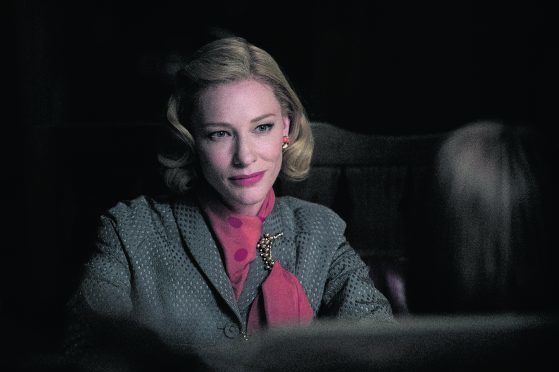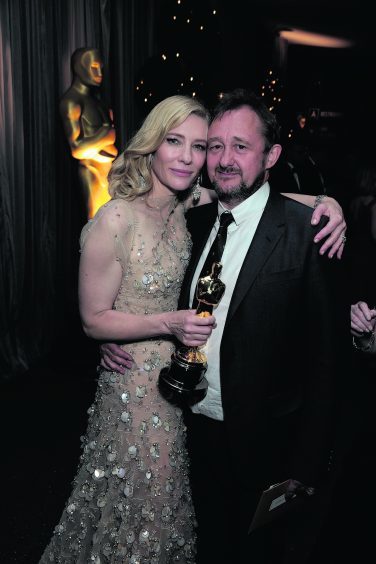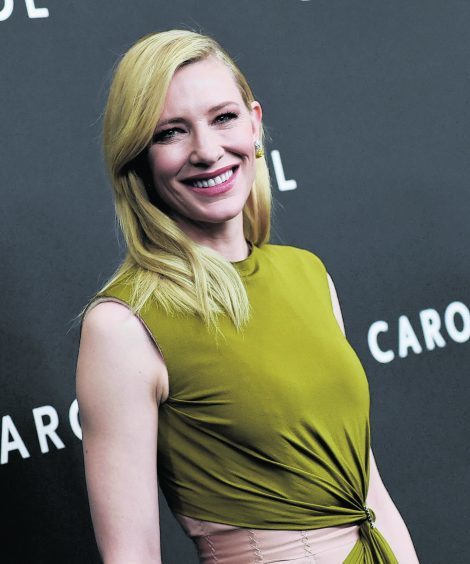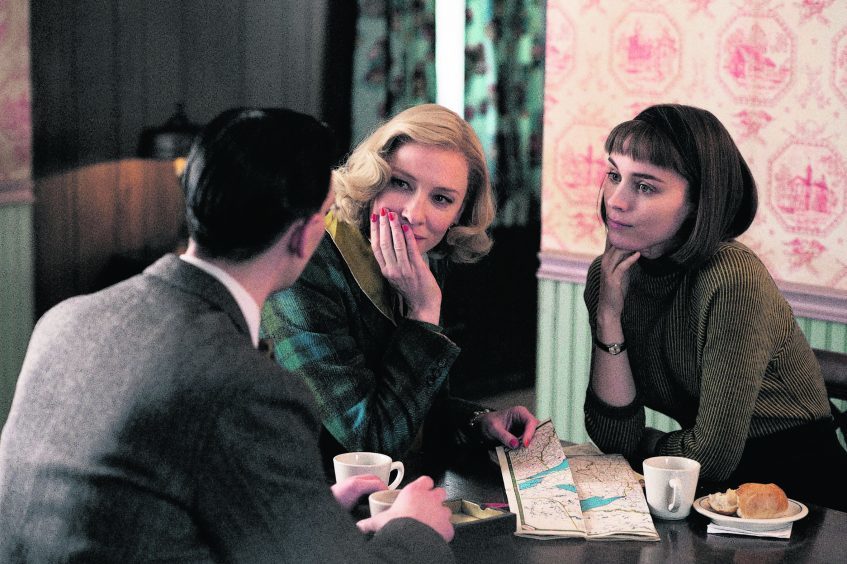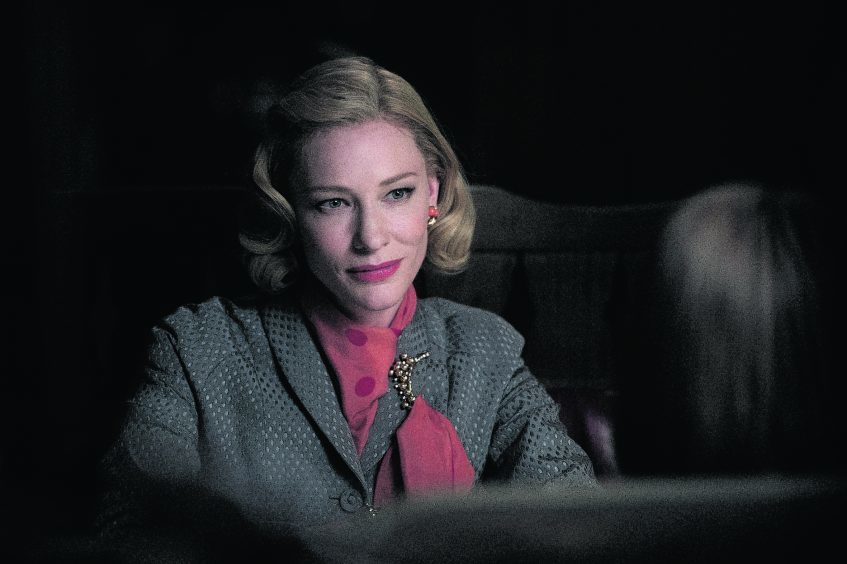Carol may be a story of forbidden love, but for captivating lead Cate Blanchett, her character’s gender holds no relevance. The multi-award-winning actress talks female empowerment and the pull of motherhood
It’s been touted as period-defining – even a ‘lesbian cult classic’ – but for Hollywood royalty Cate Blanchett, the premise behind Carol, the big-screen adaptation of Patricia Highsmith’s seminal novel, The Price Of Salt, is far simpler.
“It’s about two people falling in love, in the way that Romeo And Juliet is,” declares Blanchett, with no uncertainty in her tone.
“The film has a universal quality to it where the women’s gender is absolutely vital, an impediment to them consummating their love, but it’s not the point of the film.”
It’s late afternoon by the time our turn comes round to speak to Blanchett and, after a long day of interviews, she’s taking no prisoners. Yet ever the professional, the striking actress goes from head-in-hand tired to dynamic, two-time Academy-Award winner in a split second; ready and willing to talk.
With more than two decades of industry experience, she certainly isn’t short of work offers – but these days, her choosing, she stipulates, depends on her “engagement with the script”.
“I just think, ‘Is this a good story? Am I interested in it?’ Because if you’re not connected as an actor, then there’s a snowflake’s chance in hell that the audience is going to be.”
In the case of Carol, Blanchett’s love affair started the minute she read the 1952 book.
“I read the novel years ago, when I was making The Talented Mr Ripley – another Highsmith adaptation – with director Anthony Minghella, and loved the story, but it didn’t really become a film until Todd Haynes came on board as director, and then Rooney Mara, after which it became something that was utterly irresistible.”
The 46-year-old pauses for a moment, before pensively adding: “It’s all about the people in the end.”
And it’s hard to disagree: Carol vividly depicts the transitional period of Fifties New York. As the post-war years ushered in many voices of change, The Price Of Salt focused on an unlikely attraction between two women living in the city: Therese Belivet (Mara), a young woman in her early 20s, and Carol Aird (Blanchett), a mature, older woman in a loveless marriage.
Drawing on the aspect of unforeseen love, Emmy-nominated writer Phyllis Nagy (of Mrs Harris fame), who adapted the screenplay, and Haynes (Far From Heaven, Velvet Goldmine) beautifully recount a controversial relationship that captures the radical social climate of the era, and in turn, offers a foreshadowing perspective of what it means to have true happiness in life.
From the re-imagined, poetic backdrop of the Big Apple (shot in Cincinnati, Ohio), to the talented cast alongside Blanchett and Mara – Sarah Paulson, Kyle Chandler and Jake Lacy – it’s little surprise that Carol received a standing ovation at this year’s Cannes, not to mention its coveted spot as frontrunner at next year’s Oscars.
Struggling to understand why the characters’ gender is an issue – both then when the story was first published and now – Blanchett admits she was driven by the role’s complexities.
“The gift of working on something based on a Highsmith novel is that the interior life of the characters is so rich. She’s masterful at dealing with characters who acknowledge, in a way, that every adult has a secret.”
The Blue Jasmine star reflects: “Carol is someone who perhaps appears very remote, self-contained and self-possessed, but in a way, I think she’s crumbling. Neither Carol nor Therese fit neatly into a social circle or in that time, an underground movement. So I think they’re both ambushed by the intensity of the connection they share with each other. It’s specifically about that other person, rather than fitting into a larger group.”
As her character recognises her feelings for Therese in the film, Blanchett singles out the universal heartbreak that often comes with falling in love: “You risk being out of control, and that is all part of the intoxicating thrill.”
But the heartbreak doesn’t end at prohibited love. A key marker of the times is when mother-of-one Carol grants her estranged husband full custody of her daughter as opposed to living a lie; a scene in which a husky-voiced Blanchett, a mother-of-four in real life – three biological sons and an adopted daughter, with her playwright and screenwriter husband, Andrew Upton – confesses she “felt the pull”.
“Part of your job as an actor is to imagine your way into a character and you grow through placing yourself in someone else’s shoes,” she explains.
“I don’t try and bring my own experience to it, as every mother is different, but yes, I did feel the pain that Carol was feeling, for sure.”
Showcasing a female author, female screenplay and two female leads, Carol has joined a host of all-empowering line-ups in 2015 (alongside the likes of The Hunger Games: Mockingjay – Part 2 and Suffragette), but it’s a tag Blanchett is keen to shake, for fear it would “relegate the film to the realm of the political”.
Having worked with Haynes before in his 2007 Bob Dylan-inspired film, I’m Not There, she reasons: “The power of Carol is that it’s an apolitical film. Only Todd Haynes, who has such an outsider’s aesthetic, which is what makes his films dangerous and compelling and unusual, could have made a film about two female characters falling in love. And somehow, in the most wonderful, empowering way, normalised it.”
Carol is in cinemas now.
